Search the Special Collections and Archives Portal
Search Results

Meeting minutes for Consolidated Student Senate University of Nevada, Las Vegas, August 14, 1995
Date
1995-08-14
Archival Collection
Description
Includes meeting agenda and minutes.
Text
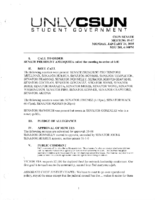
Meeting minutes for Consolidated Student Senate, University of Nevada, Las Vegas, January 24, 2005
Date
2005-01-24
Archival Collection
Description
Includes meeting minutes and agenda, along with additional information about bylaws and performance agreements.
Text
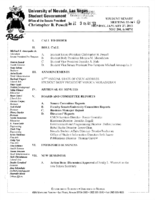
Meeting minutes for Consolidated Student Senate, University of Nevada, Las Vegas, January 27, 2003
Date
2003-01-27
Archival Collection
Description
Includes meeting minutes and agenda, along with additional information about the Constitution of Student Alliance, memorandums, and broadcaster agreements.
Text
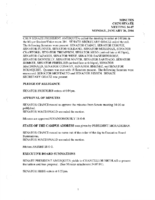
Meeting minutes for Consolidated Student Senate, University of Nevada, Las Vegas, January 26, 2004
Date
2004-01-26
Archival Collection
Description
Includes meeting minutes.
Text

Meeting minutes for Consolidated Student Senate, University of Nevada, Las Vegas, February 02, 2004
Date
2004-02-02
Archival Collection
Description
Includes meeting minutes. CSUN Session 34 Meeting Minutes and Agendas.
Text
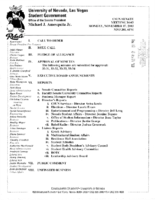
Meeting minutes for Consolidated Student Senate, University of Nevada, Las Vegas, November 17, 2004
Date
2004-11-17
Archival Collection
Description
Includes meeting agenda and minutes, along with additional information about bylaws.
Text
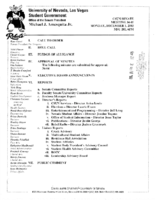
Meeting minutes for Consolidated Student Senate, University of Nevada, Las Vegas, December 01, 2004
Date
2005-12-01
Archival Collection
Description
Includes meeting minutes and agenda. CSUN Session 34 Meeting Minutes and Agendas.
Text

Meeting minutes for Consolidated Student Senate University of Nevada, Las Vegas, January 28, 2002
Date
2002-01-28
Archival Collection
Description
Includes meeting agenda and minutes.
Text

Meeting minutes for Consolidated Student Senate, University of Nevada, Las Vegas, March 19, 2001
Date
2001-03-19
Archival Collection
Description
Includes meeting minutes and agenda, along with additional information about bylaws.
Text
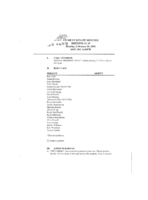
Meeting minutes for Consolidated Student Senate, University of Nevada, Las Vegas, February 26, 2001
Date
2001-02-26
Archival Collection
Description
Includes meeting minutes and agenda, along with additional information about bylaws.
Text
Pagination
Refine my results
Content Type
Creator or Contributor
Subject
Archival Collection
Digital Project
Resource Type
Year
Material Type
Place
Language
Records Classification
